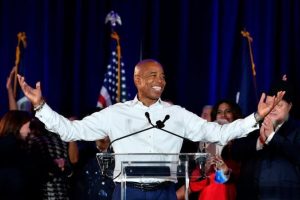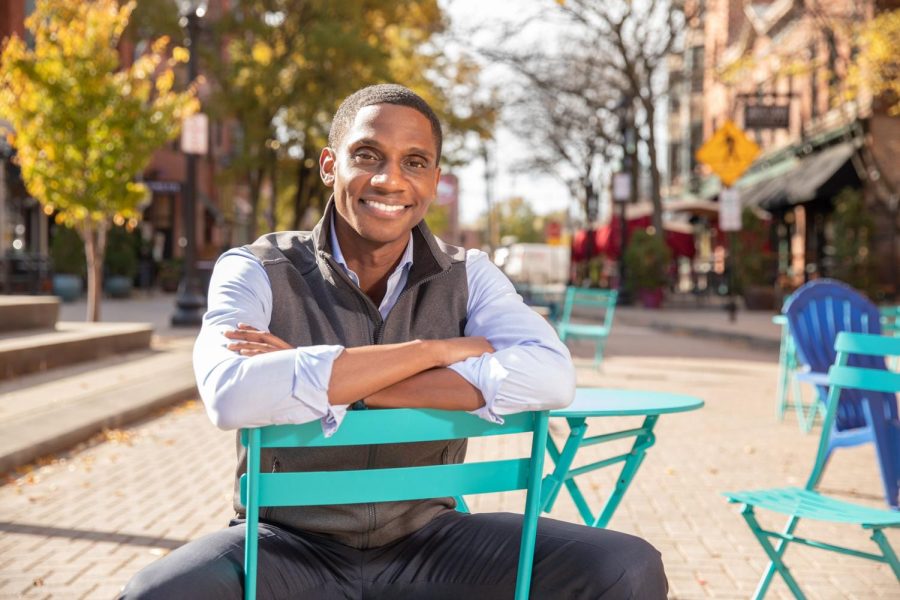Diversity and progressivism define local elections
Official Twitter account of Justin Bibb
Justin Bibb, mayor-elect of Cleveland, Ohio. Bibb, who has no prior political experience and ran an outsider campaign, will be the city’s second-youngest mayor.
Nov 18, 2021
More often than not, the only elections the American people seem to pay attention to are the presidential and midterm elections. People want to vote for the president, and their Senator and governor and maybe sometimes their representative. However, far too often, local races, specifically municipal races and ballot issues, get ignored.
Case in point: this past election day. Most of the mainstream media focused their attention either on the absolute shellacking the Democrats took in Virginia, or their surprising underperformance in New Jersey. However, local and municipal elections this year have interesting implications, mostly concerning progressives and progressive causes.
Since the surprise success of Bernie Sanders’ 2016 primary campaign, progressives and leftists have been looking for a definitive sign of electoral success. The closest they have come seems to be Alexandria Ocasio-Cortez’s stunning upset of Joe Crowley in the 2018 NY-14 primary. Since then, progressives haven’t had much success electorally, as Bernie fell decisively to Joe Biden in 2020. Additionally, progressives lost a borderline proxy-war in Ohio’s 11th congressional district, with the moderate Shontel Brown defeating Bernie-ally Nina Turner in an upset. However, it seemed in the 2021 off-year elections, progressives finally found some success in cities.
Mayors
This was most visible in mayoral races across the country, especially in the John Carroll area. Cleveland elected 34-year-old Justin Bibb, a progressive nonprofit leader with no prior political experience, to become the city’s top executive, defeating a long-time staple of Cleveland politics. Here in University Heights, incumbent Mayor Michael Dylan Brennan, endorsed by the Cuyahoga County Progressive Caucus, was re-elected to a second term. In nearby Cleveland Heights, progressive City Council Vice President Kahlil Seren became the first directly-elected mayor in the city’s history. Moving down south, Cincinnati made history when former congressional candidate Aftab Pureval became the first Asian-American mayor in the city’s history, defeating a former mayor on a platform of “fresh ideas”. He will be replacing John Cranley, gubernatorial candidate and John Carroll alumni. Lastly, the rural city of Lima, Ohio made history when it elected its first African-American and first female mayor in Sharetta Smith.

The election of progressive mayors this November goes well beyond Ohio. In Boston, Councilwoman Michelle Wu, an ally of progressive Senator Elizabeth Warren, was elected mayor on a progressive platform, most notably a city-wide Green New Deal. This is notable, as she will not only be the first elected female mayor in the history of Boston, but also the first elected person of color, as well as the first elected Asian-American mayor. In Pittsburgh, State Rep. Ed Gainey successfully primaried incumbent Mayor Bill Peduto from the left. He was elected to a full term in November, becoming the city’s first African-American mayor. Finally, in Dearborn, Michigan, Bernie-supporting State. Rep. Abdullah Hammound was elected to be its first Muslim mayor, extremely notable as Dearborn has the largest Muslim population per capita in the United States.
City Council
This wave of diverse progressivism is not limited to mayors. Nationwide, many saw success in city council elections. The Democratic Socialists of America, perhaps the most popular leftist group in the country, had many candidates affiliated with it win election to city council races across the countries, including (but not limited to) three DSA candidates in Minneapolis, Tiffany Caban in New York City, Richie Floyd in St. Petersburg and Shenise Turner-Sloss in Dayton. Additionally, New York City also sent its first Muslim member to the city council, progressive Shahana Hanif (who ironically defeated a DSA-backed candidate). Locally, progressive reform-minded candidates won election to city councils, like Rebecca Maurer in Cleveland and Josie Moore in Cleveland Heights,
Other Municipal Elections
Other elections also proved bountiful for progressives. Throughout the state of Ohio, many right-wing school board candidates failed to win as many seats as expected. These campaigns, which focused on issues like the alleged teaching of critical race theory, COVID-19 protocols and transgender athletes, failed in spit of high profile attention from Ohio GOP chair and U.S. Senate candidate Jane Timken. Additionally, several high-profile progressive lawyers won District Attorneys’ races, like Larry Krasner in Philadelphia and Alvin Bragg in Manhattan (the first black DA in New York City history).
Ballot Issues

Lastly, progressive ballot issues saw much success in the 2021 elections. Here in Cleveland, Issue 24, which sought to create a civilian police oversight board, passed in a landslide. Additionally, in Austin, Texas, Proposition A, an effort to hire hundreds of more police officers, was decisively defeated. Tucson, Arizona also voted to increase the minimum wage to $15 an hour, while the Twin Cities (Minneapolis and St. Paul) both voted into place similar laws concerning rent control.
However, it was not all sunshine and lollipops for progressives on Election Day. There were several stinging defeats as well. In the New York City Democratic primary for mayor, Brooklyn Borough President and former police officer Eric Adams, a former Republican, defeated more progressive candidates like Kathryn Garcia and Maya Wiley before going on to win the general election. Additionally, for the DSA, only two of their six endorsed candidates for city council won their races. In Buffalo, after losing the primary in an upset to DSA-back first time candidate India Walton, incumbent Mayor Byron Brown mounted a successful write-in campaign, snatching victory from the jaws of defeat. And in Minneapolis, the center of the racial protests that engulfed last summer, a proposition to replace the police department with a public safety force was voted down decisively.
But despite these shortcomings, progressives have a lot to feel good about this election cycle. This class of municipal leaders was some of the most progressive and diverse (did you notice the amount of “firsts” listed above?) we’ve seen in quite some time, both here at home and across the country. And it may not be over yet; as of the time of this writing, the frontrunner for next year’s Los Angeles mayor’s race is Rep. Karen Bass, a progressive who was on Biden’s shortlist for Vice-President, possibly becoming the city’s first female mayor. It is appearing that as progressivism picks up steam in municipal politics, it is also becoming more and more diverse. Ultimately, it appears that an age of diverse, progressive municipalism not seen since the early Progressive Era is on the horizon, and only time will tell if it will last.













